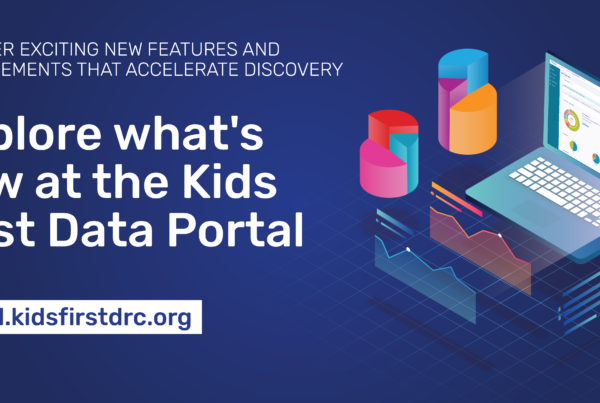The NIH Common Fund-supported Gabriella Miller Kids First Data Resource Center (Kids First DRC) was born out of a desire to unite researchers across the country and the world through shared resources; to uncover key insights that could potentially lead to better treatments for children with cancer, structural birth defects, and other rare diseases the world over. When first launched, the idea of breaking down barriers to cross-collaboration was a novel one. Rarely before – let alone on such a large scale – had research labs, healthcare organizations, or even public institutions had the ability to share data and key research findings in near real-time for the overall betterment of pediatric medicine and the benefit of children whose lives are everyday affected by the devastating impact of these conditions.
At the present moment, when global healthcare challenges demand open collaboration towards solving a common crisis as swiftly as possible, the revolutionary model of research championed by the Kids First DRC seems almost prescient. At present, the broader medical research community has seen the value of a framework that favors collective solutions over individual credit.
Through emerging challenges, the Kids First DRC has resolutely carried on its mission on behalf of children, continuing to grow its index of clinical and genomic data and to further develop analysis tools and workflows to assist investigators working at any time and anywhere on earth in making an impact on the health of patients.
Expanded Resources
This spring, the Kids First DRC was excited to add a new dataset to the Data Resource Portal, bringing the total number of searchable datasets to 15. This dataset was generated through the Kids First X01 study on Genome-wide Sequencing to Identify the Genes Responsible for Enchondromatoses and Related Malignant Tumors led by Dr. Nara Sobreira of Johns Hopkins University. The data include whole genome sequences (WGS) and aligned reads from family duos and trios, for patients experiencing Ollier disease and Maffucci syndrome. 12.8TB of data collected from 79 study participants and 27 families is currently harmonized and available within this dataset.
Bioinformatics experts at the Kids First DRC have developed and/or updated a number of analysis workflows for investigators, including an alignment workflow update which enables investigators to more quickly harmonize genomic data with mixed input file formats.
Coming in May, the Kids First DRC’s will be launching its HPO Ontology Browser , allowing registered users to more easily search phenotypic data found across datasets within the Data Resource Portal. Harmonized using Human Phenotype Ontology standards, data within the Portal will be more useful for searching and cohort selection, analytics and mechanism discovery. Users will be able to search by a number of categories including phenotypic abnormality, clinical course, mode of inheritance, blood group, past medical history, and more.
Growth Through Collaboration
The importance of deep phenotyping methods was recently explored during a webinar held on April 09, hosted by the Kids First Data Resource Center and the Monarch Initiative and open to Kids First investigators and other researchers interested in deep phenotyping and translation research. The webinar’s goal was to highlight the richness and complexities of phenotypic data associated with Kids First datasets and specific needs for their interoperability.
The webinar included presentations by a number of Kids First investigators and data scientists, and was followed by an open discussion on how best to improve the utility of phenotypic data generated by the research and clinical community to accelerate genotype-phenotype discoveries. A full summary of the event and a link to the webinar’s recording can be found here.
Recently, the Kids First Data Resource Center formally launched a partnership with the NIH Science and Technology Research Infrastructure for Discovery, Experimentation, and Sustainability (STRIDES) Initiative, which will enable the two programs to collaborate through Amazon Web Services (AWS) and the Cavatica analysis platform.
The STRIDES Initiative provides cost-effective access to industry-leading partners to help advance biomedical research. These partnerships enable access to rich datasets and advanced computational infrastructure, tools, and services.
The STRIDES Initiative is one of many NIH-wide efforts to implement the NIH Strategic Plan for Data Science, which provides a roadmap for modernizing the NIH biomedical data science ecosystem.
Moving Forward
The Kids First DRC continues unabated in growing and compiling rich datasets representing childhood cancers and structural birth defects, and will continue to foster collaboration and scientific discovery across the global childhood and adult bioresearch community. Through continued development of this data resource and in creating opportunities for investigators to work together, the Kids First DRC will maintain its place as a leading champion for the advancement of open science and data sharing to support the development of better treatments and scientific insights to benefit children everywhere.
To get involved in these efforts, contact the Kids First DRC team at support@kidsfirstdrc.org. You can also visit https://kidsfirstdrc.org/support/getting-started/ to follow our Quick-Start guide to creating your free Data Resource Portal account today!










